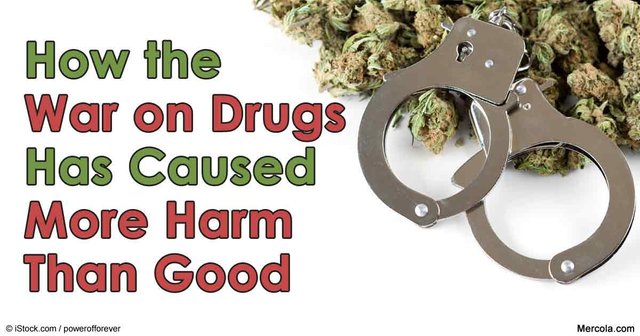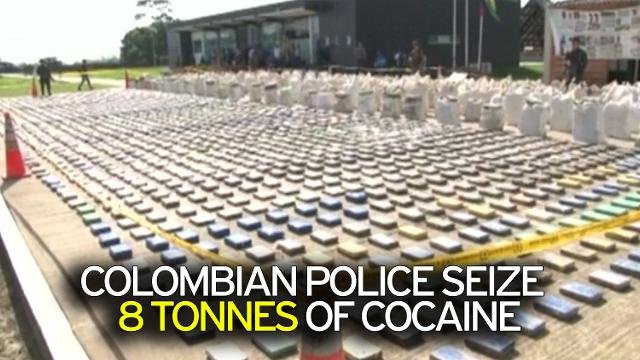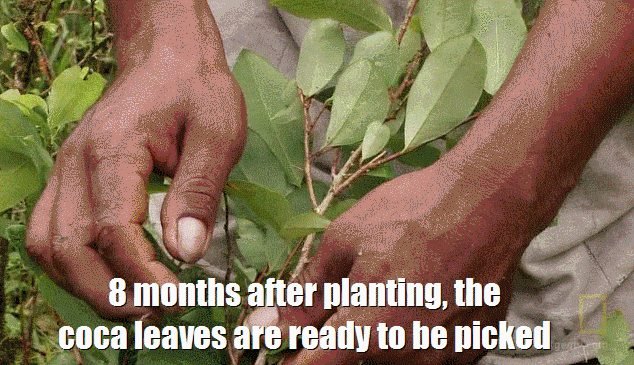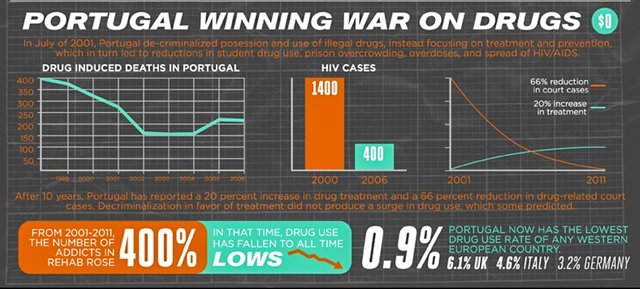The War On Drugs Is A War On You (Part 2) - How The War On Drugs Has Caused More Harm Than Good
In part one of The War On Drugs Is A War On You - How Prisons Prey On The Poor, we looked at the US domestic problems resulting from the war on drugs. This time round we're going to look at some of the major drugs producing nations.

For the past few decades politicians across the globe have tried to destroy the trade in illegal narcotics, costing taxpayers trillions and resulting in more drugs and drug use than before this war started.
The war on drugs has turned drugs users into criminals while producers have become extremely wealthy people.
Perhaps the best example of how the war on drugs has been so unjust for people can be found in Mexico where cartels make huge sums of cash and more than 70,000 people have been killed and some of the stats on drug-related crimes in Mexico are quite staggering.
Last year it's thought that more than 100,000 people were kidnapped but 99% of them weren't reported. That's because people fear reprisals from the cartels if they go to the police and if they do take that risk it's quite rare for anything to be done about it.
The Mexican justice system is in tatters. Only between 4 and 7% of all crimes were investigated last year and only around 30% of people arrested on drugs charges over a five year period were convicted. credit
Nearly 28,000 people were murdered in Mexico last year and 98% of them went unsolved. And instead of the war on drugs crippling the cartels, they've actually flourished and become richer.
Joaquín 'el Chapo' Guzmán, head of the Sinaloa cartel which is Mexico's biggest, made the Forbes billionaire list in 2009 and he'd still be on it if it wasn't considered to be glorifying crime.
He was able to launder a vast amount of that money because the banking giant HSBC failed to carry out basic due diligence in Mexico. credit
They were fined nearly 2 billion dollars for that failure but that's a different story.
So instead of putting an end to the drugs trade, the war on drugs has actually created an ultra violent part of the world where people fear for their security, where drugs gangs make a huge amount of money and there are more narcotics than ever making their way to the US border.
"The one thing we cannot go on to do is to go on pretending that the war on drugs is working."
The war on drugs in Mexico has been a failure but lets take a look at some of the other effects.
Colombia is thought to be the world's second most bio-diverse country. Drugs producers cut down large areas of forest to produce their crop, but that's nothing compared to what's done to stop them.
Over the years there's been a campaign of aerial fumugation. That's when chemicals are sprayed over vast areas to destroy these plantations, but they also indiscriminately kill plant life, destroy animals habitats, and contaminate waterways. Excellent. The producers just move on.
More areas are cut down, more chemicals are sprayed and the cycle continues. It's what's known as the balloon effect.
The balloon effect is an often cited criticism of United States drug policy. This effect draws an analogy between efforts to eradicate the production of illegal drugs in South American countries and what happens to the air inside of a latex balloon when it is squeezed. The air is moved, but does not disappear. This displacement is also known as the "balloon effect"; pressure applied in one area pushes the air into another area of less resistance.
This effect happened:
- with fumigation of marijuana in Mexico, in which the drugs migrated to Colombia.
- with marijuana in the Sierra Nevada de Santa Marta, which migrated to Cauca.
- In the late 1990s coca was largely eradicated in Peru and Bolivia, only to be replaced by new crops in Colombia.
- Recently, with the intense spraying in the Colombian Putumayo Department, coca has been planted in other departments including Arauca, Cauca, Caquetá, Guaviare, Huila, Meta, Nariño, and Santander.
A United Nations Development Programme Colombia described the balloon effect this way:
"The economic mechanism underlying the global effect is quite simple: the success of eradication in one area temporarily reduces the supply, and that translates into a price rise. Then, given that the supply function is fairly elastic, higher prices stimulate people to plant crops in other places." The costs to start planting are quite low "given that the majority of property rights on land planted with illicit crops are ill defined credit

So every time you see pictures like this of police standing in front of bags of weed or burning huge piles of opiates, seizures of cocaine or wads of cash, it's not so much a sign of success as proof that the illegal drugs trade is carrying on regardless. credit
The war on drugs has also resulted in a war on human rights and there are countless examples from people being denied a fair trial to actually being tortured.
Perhaps the worst of these is extra judicial killings. In 2009 the Pentagon put 50 Afghan drug traffickers on a 'kill or capture' list. Some were militants, but some weren't, and the death penalty for drugs offenses is illegal under international law.
In 2010 in Iran, 590 out of 650 executions were because of drugs related offenses.
But maybe the worst one was the Thai government's anti drugs offenses in 2003. In the first three months of their war on drugs there were 2,800 extra judicial killings and in 2007, the Thai narcotics control board admitted that half of those deaths had no links to drugs at all.
Next lets go to Bolivia.
In many Andean regions chewing Cocoa leaves is something that indigenous people have done for health reasons and as a cultural practice for centuries. credit
Among other things chewing cocoa leaves helps to soften the effects of altitude sickness which is helpful in the mountains.

The UN enshrines the rights of indigenous people to be consulted on any law that effects them. The universally adopted declaration on the rights of indigenous people guarantees them the right to practice their cultural tradition but the single convention on narcotics drugs which was signed in 1961 effectively made the traditional use of cocoa leaves illegal.
That prompted the Bolivian government to pull out of the convention and they didn't rejoin until last year when an amendment to the convention re-permitted coca leaf chewing.
Criminalizing the drugs trade makes addicts take more risk. That could be using needles that aren't clean or creating their own drugs cocktails or going on massive binges.
Users don't necessarily know how strong or pure their drugs are and a lot of overdosing is caused, not by a user taking a greater amount than usual but because they've got a purer drug than normal and if drugs are made so difficult to obtain or the price is pushed up, addicts tend to resort to cheaper alternatives. One where the risks aren't necessarily known. Just look at the Krokodil epidemic in Russia.
Heroine users began to take it when they couldn't get their usual fix and it turned out that it melts people's flesh away to the bone. credit
Afghanistan is home to 90% of the world's heroine production and international forces have been fighting a war there for more than a decade.
But that's the war on terror isn't it? Well yeah, it is, but the Taliban make $700 million a year from heroine. In fact, it's their main source of funding so it's one of the main goals of that war to destroy the illegal drugs trade, but despite the fact they've been trying for 12 years, this year is expected to provide a bumper crop.
Globally more than 100 billion dollars is spent trying to enforce prohibition, although you can push that number up even further if you include the Afghan war.
An estimated 300 million people use drugs worldwide and the global narcotics market is thought to be worth around $330 billion a year. credit
So you've probably worked this one out for yourself, but it's not been great value for money.
"The policy they have in place is not effective. It's a failure and most people recognize that in this country."
There are examples of countries like Amsterdam and Portugal that have treated drug use as a medical problem where addicts are given treatment and counseling as opposed to viewing them as criminals.
Evidence points to many successes with such an approach and such shifts in policy have reduced crime and addiction rates in those countries.
In 2001, the Portuguese government did something that the United States would find entirely alien. After many years of waging a fierce war on drugs, it decided to flip its strategy entirely: It decriminalized them all.
If someone is found in the possession of less than a 10-day supply of anything from marijuana to heroin, he or she is sent to a three-person Commission for the Dissuasion of Drug Addiction, typically made up of a lawyer, a doctor and a social worker. The commission recommends treatment or a minor fine; otherwise, the person is sent off without any penalty. A vast majority of the time, there is no penalty.
Fourteen years after decriminalization, Portugal has not been run into the ground by a nation of drug addicts. In fact, by many measures, it's doing far better than it was before.
At first, the government responded to it as the United States is all too familiar with: a conservative cultural backlash that vilified drug use and a harsh, punitive set of policies led by the criminal justice system. Throughout the 1980s, Portugal tried this approach, but to no avail: By 1999, nearly 1% of the population was addicted to heroin, and drug-related AIDS deaths in the country were the highest in the European Union, according to the New Yorker.
But by 2001, the country decided to decriminalize possession and use of drugs, and the results have been remarkable.
Drug use among the whole population was reduced significantly, particularly in the 15 to 24-year old population, HIV infection rates fell as well as drug-relayed arrests.

But some social scientists have cautioned against attributing all the numbers to decriminalization itself, as there are other factors at play in the national decrease in overdoses, disease and usage.
At the turn of the millennium, Portugal shifted drug control from the Justice Department to the Ministry of Health and instituted a robust public health model for treating hard drug addiction.
It also expanded the welfare system in the form of a guaranteed minimum income. Changes in the material and health resources for at-risk populations for the past decade are a major factor in evaluating the evolution of Portugal's drug situation. credit
The main lesson to learn is decriminalizing drugs doesn't necessarily lead to disaster, and it does free up resources for more effective responses to drug-related problems.
Related posts
The War On Drugs Is A War On You - How Prisons Prey On The Poor

Upvoted followed and resteemed!!
Thank you. It's time to look at other options concerning drugs, don't you think?
Yes indeed.
great report up voted and followed
Thanks
very nice article and agree 100%, the war on drugs has failed. decriminalization and education are the answers to drug addiction.
Whether I want to kill myself snorting cocaine all day or not is my personal decision and not any government's decision; just like I am free to eat as many fatty foods as I like and die from heart disease at 28y/o weighing 400pounds is my personal decision and not any government's decision.
I agree, besides, there seems to be evidence that legalization works. The sky doesn't fall and the numbers of addicts decrease.
This post has been ranked within the top 10 most undervalued posts in the second half of Jan 03. We estimate that this post is undervalued by $19.83 as compared to a scenario in which every voter had an equal say.
See the full rankings and details in The Daily Tribune: Jan 03 - Part II. You can also read about some of our methodology, data analysis and technical details in our initial post.
If you are the author and would prefer not to receive these comments, simply reply "Stop" to this comment.